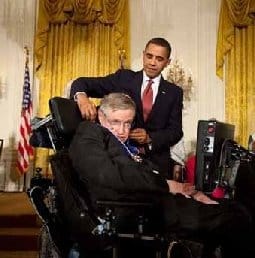
Credit: Official White House photo by Chuck Kennedy
By Matin Durrani
The Times newspaper has today drawn up a list of the UK’s “100 most important scientists”.
If you haven’t seen the list, which appears in the paper’s excellent Eureka! monthly science magazine, I can reveal that the list is topped by the Nobel-prize-winning geneticist Sir Paul Nurse, who discovered the genes that control cell division. The Times dubs him the UK’s “superman of science”.
Second up is Sir Mark Walport, director of the biomedical charity the Wellcome Trust, which doles out a tidy £600m a year on research. According to the paper, Walport “sports a moustache to rival the legendary handlebars” of the trust’s founder Sir Henry Wellcome.
And if you’re wondering if there are any physicists on the list, don’t worry: there are plenty. In third place is Stephen Hawking, who needs no introduction to physicsworld.com readers, although in case you’re wondering, he’s the “cosmologist and best-selling author”.
The other physicists on the list are the president of the Royal Society Martin Rees (8th), who took part in a physicsworld.com video interview last February, Andre Geim, who only two days ago won this year’s Nobel Prize for Physics for his discovery of graphene (9th) and Philip Campbell, editor of Nature and founding editor of Physics World magazine (13th). (Eureka! obviously went to press before Geim scooped the Nobel gong as the entry on him doesn’t mention the award. Still it shows the list can’t be totally unreliable.)
Next up, in 15th, is Jocelyn Bell Burnell, who last week completed her two-year term as the first female president of the Institute of Physics, which publishes physicsworld.com.
In 17th you’ve got Cambridge University physicist Richard Friend, the “plastic electronics pioneer” whose work on light-emitting polymers has “contributed more to our enjoyment of life than almost any living physicist”. Apparently.
Popping up in 18th is another Cambridge physicist – David Mackay, chief scientific adviser to the UK’s Department of Energy and Climate Change. In case you missed it, check out our review of Mackay’s excellent book on the energy challenge.
Next on the list is Brian Cox – Manchester University particle physicist and TV presenter – who is in the 25th spot. Cox is so well known he even featured in physicsworld.com‘s own April fool earlier this year.
Still in the top 30, we find “alien hunter” Paul Davies (27th), who wrote a great feature for us and presented a superb webinar on the search for extraterrestrial life earlier this year, followed by the Nobel-prize-winning Sir Peter Mansfield (28th), who co-invented MRI.
Further down is the science writer and libel-reform campaigner Simon Singh (33rd), Peter Higgs (34th), climate scientist Sir John Houghton (42nd) and the Imperial College London invisibility-cloak inventor Sir John Pendry (48th).
In 51st is entrepreneur and founder of Acorn Computers Hermann Hauser, followed by Tim Berners-Lee (52nd), optical-fibre expert David Payne (56th) and Steven Cowley (58th) – the head of the Culham Centre for Fusion Energy and author of an excellent article in the October issue of Physics World on the prospects for fusion.
I hope you’re not nodding off by now, but in 62nd is Imperial College’s Jim Virdee – spokesperson for the Large Hadron Collider’s massive CMS experiment and who features in this physicsworld.com video. In 67th is Virdee’s Imperial colleague and all-round optics nice-guy Sir Peter Knight.
In 68th we find Lord John Browne – the former boss of oil giant BP turned “super adviser”, who wrote for us on the challenges of climate change. Cambridge University dark-matter expert George Efstathiou, meanwhile, is 69th, one place ahead of Robin Millar from the University of York in 70th, who is also the only science educator on the list and a winner of the Bragg medal of the Institute of Physics two years back.
Next up is Mark Welland, who makes an appearance in 85th as chief scientific adviser to the UK’s Ministry of Defence. Bringing up the rear in 99th is Steve Bramwell, “inventor of magnetricity” at the London Centre for Nanotechnology.
Right, and if you’re wondering who is responsible for this list, which no doubt you either strongly agree or disagree with, step forward The Times‘ four-strong panel. It is made up of Cambridge University physicist Athene Donald (and my former PhD supervisor), ex-UK science minister William Waldegrave, Imperial College science-communication lecturer Alice Bell and former Liberal Democrat MP Evan Harris.
They ranked a list of top scientists from a long-list drawn up by The Times‘ staff based on recommendations by the great and good in academia, business and public life.
So what do you think of the top 100? Comment below if you think the placings are all wrong, or if you think there is someone else from the physics community who should have made it onto the list. No doubt you’ll have your views.



